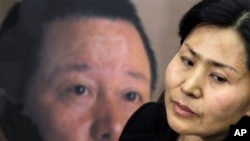Veteran Chinese dissident Bao Tong’s phone was cut off last October, shortly after the Nobel Peace Prize committee named jailed Chinese writer Liu Xiaobo its 2010 laureate. Bao’s phone service was only recently restored.
Bao is the highest ranking person to have been jailed for supporting protesting students in Beijing in 1989.
He, along with other activists are hoping Presidents Barack Obama and Hu Jintao will hold substantive talks about Beijing's human rights record during Mr. Hu's state visit to Washington, which began on Tuesday. The Chinese leader is scheduled to hold extensive talks with Mr. Obama, meetings with congressional leaders and take a trip to Chicago.
Bao says human rights is too important of an issue for the two leaders not to talk about. The discussions should not just be superficial, Bao adds, but should be in depth and have results.
Another activist, Ding Zilin, is one of the main organizers of a group called "Tiananmen Mothers," made up of people whose family members were killed when Chinese troops crushed the demonstrations in 1989. Her son was killed.
She says she thinks Sino-American differences in human rights have been overshadowed by economic disputes and security issues. Therefore, she says she would like to see how Mr. Obama and Mr. Hu discuss human rights. Ding says she does not want their talks to be like before, when, in her opinion, talk about human rights was just a show.
She is especially angered by the Chinese government’s response to Liu Xiaobo’s Nobel Prize. The reaction included putting Liu’s wife, Liu Xia, under house arrest, and cutting off her communication with the outside world, even though she has committed no crime.
Ding is one of scores of activists in China who were put under house arrest after Liu won the prize. Like Bao Tong, her phone was only recently restored.
Authorities also harassed Chinese lawyers who were active in defending civil society cases.
Martin Flaherty is a law professor at Fordham University. He works with the Committee to Support Chinese Lawyers, made up of lawyers from outside China who seek to promote the independence of Chinese lawyers.
"You know the larger story, as I am sure you know, is that in the last two years or so, maybe two and a half years, there has been what appears to be a concerted crackdown on the small number of civil rights and human rights lawyers in China," Flahery said. "You know, we've had some fairly high profile ones."
One example of this crackdown is Gao Zhisheng, a human rights lawyer who disappeared into police detention in 2009. He briefly resurfaced last April, but then disappeared again.
Gao was jailed on subversion charges in 2006, but his sentence was suspended and he was released early. He has been described as a galvanizing force for China’s rights movement, and has argued cases to defend property rights, as well as political and religious dissenters.
Gao’s wife Geng He, who fled to the United States, has appealed to President Obama to raise her husband’s case with President Hu.
Critics of China’s human rights record on Capitol Hill urged President Obama to call on the Chinese government to also release Nobel laureate Liu Xiaobo.
China denies abusing human rights and says Liu Xiaobo is a convicted criminal. China also points to its economic growth, which has lifted hundreds of millions of people out of extreme poverty, as proof of its concern for human rights.
Although China still makes clear it does not tolerate much dissent, Chinese citizens in the past 30 years have gotten increased freedom to travel domestically and aboard, while people also have access to a greater range of publications and television programming than they did a few decades ago.





